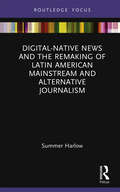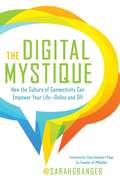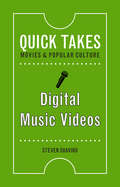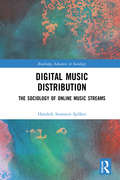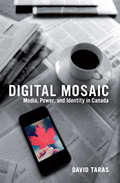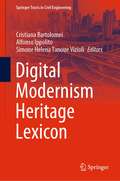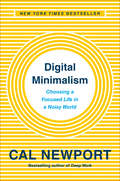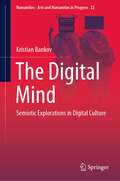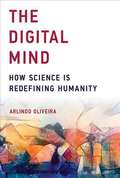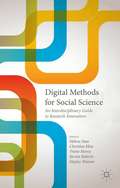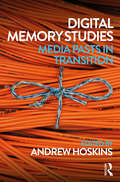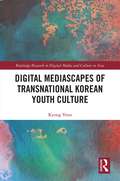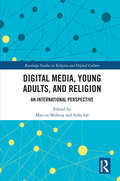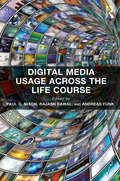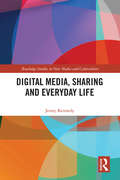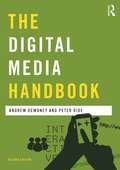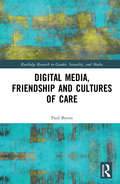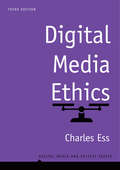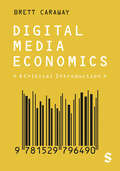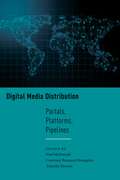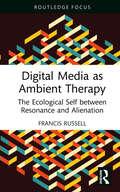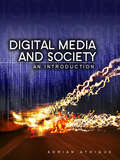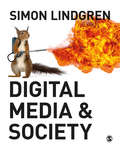- Table View
- List View
Digital-Native News and the Remaking of Latin American Mainstream and Alternative Journalism (Disruptions)
by Summer HarlowDigital-Native News and the Remaking of Latin American Mainstream and Alternative Journalism explores the rise of independent, digital-native news outlets in Latin America and their role in social change, protest participation, and the refinement of the concept of "alternative" media. Drawing upon a decade of original research, including interviews, surveys, focus groups, and content analyses, this book questions how the emergence of online-native news sites in Latin America is redefining our understanding of what it means to be mainstream and what it means to be alternative. By analyzing a wide range of elements, from business models and audience behaviors to social media use and the role of gender, this text examines how these sites are challenging traditional, hegemonic mainstream news media and its service to political and economic elites. The result is a discerning investigation into the new brand of journalism these sites have innovated. This insightful study will be of interest to journalism, communication, and Latin American scholars, particularly those interested in how technology is moulding journalistic practices and changing conceptions of journalism itself.
The Digital Mystique
by Sarah GrangerIn The Digital Mystique, Sarah Granger-a nationally recognized expert on online culture and social technology-shows us how digital media is shaping our lives in real time. Whether it's how we raise our children, communicate in love and partnerships, support causes, or establish friendships and trust, Granger pinpoints the best ways to seize digital opportunities to make our lives richer and fuller.While the Internet era is one that is frequently criticized as undermining our health, privacy, concentration, and ability to sustain real-world relationships, Granger takes a more optimistic and empowering view. She shares real-life stories and surprising facts about our lives-both online and off-to shed new and fascinating light on the positive effects of the digital media revolution, showing us how we can personally learn, grow, and thrive by engaging in our digitized world.The Digital Mystique includes the following chapters:Connecting Is Just the Beginning.YOUFriending Is TrendingLove in the Time of MessagingThe Kids Are OnlineThe Senior MomentThe Passion of the WebThere's No Business Like E-BusinessCommunity Is the KeyThe Difference a Tweet MakesWhat We Leave BehindA Stitch in Digital Time
Digital Music Videos
by Steven ShaviroMusic videos today sample and rework a century’s worth of movies and other pop culture artifacts to offer a plethora of visions and sounds that we have never encountered before. As these videos have proliferated online, they have become more widely accessible than ever before. In Digital Music Videos, Steven Shaviro examines the ways that music videos interact with and change older media like movies and gallery art; the use of technologies like compositing, motion control, morphing software, and other digital special effects in order to create a new organization of time and space; how artists use music videos to project their personas; and how less well known musicians use music videos to extend their range and attract attention. Surveying a wide range of music videos, Shaviro highlights some of their most striking innovations while illustrating how these videos are creating a whole new digital world for the music industry.
Digital Music Distribution: The Sociology of Online Music Streams (Routledge Advances in Sociology)
by Hendrik Storstein SpilkerThe digital music revolution and the rise of piracy cultures has transformed the music world as we knew it. Digital Music Distribution aims to go beyond the polarized and reductive perception of ‘piracy wars’ to offer a broader and richer understanding of the paradoxes inherent in new forms of distribution. Covering both production and consumption perspectives, Spilker analyses the changes and regulatory issues through original case studies, looking at how digital music distribution has both changed and been changed by the cultural practices and politicking of ordinary youth, their parents, music counter cultures, artists and bands, record companies, technology developers, mass media and regulatory authorities. Exploring the fundamental change in distribution, Spilker investigates paradoxes such as: The criminalization of file-sharing leading not to conflicts, but to increased collaboration between youths and their parents; Why the circulation of cultural content, extremely damaging for its producers, has instead been advantageous for the manufacturers of recording equipment; Why more artists are recording in professional sound studios, despite the proliferation of good quality equipment for home recording; Why mass media, hit by many of the same challenges as the music industry, has been so critical of the way it has tackled these challenges. A rare and timely volume looking at the changes induced by the digitalization of music distribution, Digital Music Distribution will appeal to undergraduate students and policy makers interested in fields such as Media Studies, Digital Media, Music Business, Sociology and Cultural Studies.
Digital Mosaic: Media, Power, And Identity In Canada
by David TarasDigital Media has transformed the way Canadians socialize and interact, conduct business, experience culture, fight political battles, and acquire knowledge. Traditional media, including newspapers and conventional TV networks, remain the primary link to Canada's political sphere but are under concerted attack. YouTube, blogs, online broadcasting, Facebook, and Twitter have opened new and exciting avenues of expression but offer little of the same "nation-building glue" as traditional media. Consequently, Canada is experiencing a number of overlapping crises simultaneously: a crisis in news and journalism, threats to the survival of the media system as a whole, and a decline in citizen engagement. In Digital Mosaic, David Taras both embraces and challenges new media by arguing that these coinciding crises bring exciting opportunities as well as considerable dangers to democratic life and citizen engagement in Canada.
Digital Modernism Heritage Lexicon (Springer Tracts in Civil Engineering)
by Cristiana Bartolomei Alfonso Ippolito Simone Helena Tanoue VizioliThe book investigates the theme of Modernism (1920-1960 and its epigones) as an integral part of tangible and intangible cultural heritage which contains the result of a whole range of disciplines whose aim is to identify, document and preserve the memory of the past and the value of the future. Including several chapters, it contains research results relating to cultural heritage, more specifically Modernism, and current digital technologies. This makes it possible to record and evaluate the changes that both undergo: the first one, from a material point of view, the second one from the research point of view, which integrates the traditional approach with an innovative one. The purpose of the publication is to show the most recent studies on the modernist lexicon 100 years after its birth, moving through different fields of cultural heritage: from different forms of art to architecture, from design to engineering, from literature to history, representation and restoration. The book appeals to scholars and professionals who are involved in the process of understanding, reading and comprehension the transformation that the places have undergone within the period under examination. It will certainly foster the international exchange of knowledge that characterized Modernism
Digital Minimalism: Choosing a Focused Life in a Noisy World
by Cal Newport<P><P>Minimalism is the art of knowing how much is just enough. Digital minimalism applies this idea to our personal technology. It's the key to living a focused life in an increasingly noisy world. <P><P>In this timely and enlightening book, the bestselling author of Deep Work introduces a philosophy for technology use that has already improved countless lives. <P><P>Digital minimalists are all around us. They're the calm, happy people who can hold long conversations without furtive glances at their phones. They can get lost in a good book, a woodworking project, or a leisurely morning run. They can have fun with friends and family without the obsessive urge to document the experience. They stay informed about the news of the day, but don't feel overwhelmed by it. They don't experience "fear of missing out" because they already know which activities provide them meaning and satisfaction. <P><P>Now, Newport gives us a name for this quiet movement, and makes a persuasive case for its urgency in our tech-saturated world. Common sense tips, like turning off notifications, or occasional rituals like observing a digital sabbath, don't go far enough in helping us take back control of our technological lives, and attempts to unplug completely are complicated by the demands of family, friends and work. What we need instead is a thoughtful method to decide what tools to use, for what purposes, and under what conditions. <P><P>Drawing on a diverse array of real-life examples, from Amish farmers to harried parents to Silicon Valley programmers, Newport identifies the common practices of digital minimalists and the ideas that underpin them. He shows how digital minimalists are rethinking their relationship to social media, rediscovering the pleasures of the offline world, and reconnecting with their inner selves through regular periods of solitude. He then shares strategies for integrating these practices into your life, starting with a thirty-day "digital declutter" process that has already helped thousands feel less overwhelmed and more in control. <P><P>Technology is intrinsically neither good nor bad. The key is using it to support your goals and values, rather than letting it use you. This book shows the way.
The Digital Mind: Semiotic Explorations in Digital Culture (Numanities - Arts and Humanities in Progress #22)
by Kristian BankovThis book reveals the core features of digital culture, examined by means of semiotic models and theories. It positions commercial and market principles in the center of the digital semiosphere, avoiding the need to force the new cultural reality into the established textualist or pragmatist paradigms. The theoretic insights and case studies presented here argue for new semiotic models of inquiry that include working with big data, user experience and nethnography, along with conventional approaches.The book develops a new concept of identity in the digital age, analyzing the digital flows of recognition and value, which led to the tremendous success of Social Media and the Web 2.0 era. Self-expression, entertainment and consumerism are seen as the major drivers of identity formation in the post-truth era, where the self can no longer be considered independently of a given person’s communication devices, where a substantial part of it is stored and actualized. It will be of interest to semioticians and researchers working on digital culture.
The Digital Mind: How Science Is Redefining Humanity
by Arlindo OliveiraHow developments in science and technology may enable the emergence of purely digital minds--intelligent machines equal to or greater in power than the human brain. <P><P> What do computers, cells, and brains have in common? Computers are electronic devices designed by humans; cells are biological entities crafted by evolution; brains are the containers and creators of our minds. But all are, in one way or another, information-processing devices. The power of the human brain is, so far, unequaled by any existing machine or known living being. Over eons of evolution, the brain has enabled us to develop tools and technology to make our lives easier. Our brains have even allowed us to develop computers that are almost as powerful as the human brain itself. In this book, Arlindo Oliveira describes how advances in science and technology could enable us to create digital minds. <P><P> Exponential growth is a pattern built deep into the scheme of life, but technological change now promises to outstrip even evolutionary change. Oliveira describes technological and scientific advances that range from the discovery of laws that control the behavior of the electromagnetic fields to the development of computers. He calls natural selection the ultimate algorithm, discusses genetics and the evolution of the central nervous system, and describes the role that computer imaging has played in understanding and modeling the brain. Having considered the behavior of the unique system that creates a mind, he turns to an unavoidable question: Is the human brain the only system that can host a mind? If digital minds come into existence--and, Oliveira says, it is difficult to argue that they will not--what are the social, legal, and ethical implications? Will digital minds be our partners, or our rivals?
Digital Methods for Social Science: An Interdisciplinary Guide To Research Innovation
by Hayley Watson Steven Roberts Yvette Morey Christine Hine Helene SneeThis timely book inspires researchers to deploy relevant, effective, innovative digital methods. It explores the relationship of such methods to 'mainstream' social science; interdisciplinarity; innovations in digital research tools; the opportunities (and challenges) of digital methods in researching social life; and digital research ethics.
Digital Memory Studies: Media Pasts in Transition
by Andrew HoskinsDigital media, networks and archives reimagine and revitalize individual, social and cultural memory but they also ensnare it, bringing it under new forms of control. Understanding these paradoxical conditions of remembering and forgetting through today’s technologies needs bold interdisciplinary interventions. Digital Memory Studies seizes this challenge and pioneers an agenda that interrogates concepts, theories and histories of media and memory studies, to map a holistic vision for the study of the digital remaking of memory. Through the lenses of connectivity, archaeology, economy, and archive, contributors illuminate the uses and abuses of the digital past via an array of media and topics, including television, videogames and social media, and memory institutions, network politics and the digital afterlife.
Digital Mediascapes of Transnational Korean Youth Culture (Routledge Research in Digital Media and Culture in Asia)
by Kyong YoonDrawing on vivid ethnographic field studies of youth on the transnational move, across Seoul, Toronto, and Vancouver, this book examines transnational flows of Korean youth and their digital media practices. This book explores how digital media are integrated into various forms of transnational life and imagination, focusing on young Koreans and their digital media practices. By combining theoretical discussion and in depth empirical analysis, the book provides engaging narratives of transnational media fans, sojourners, and migrants. Each chapter illustrates a form of mediascape, in which transnational Korean youth culture and digital media are uniquely articulated. This perceptive research offers new insights into the transnationalization of youth cultural practices, from K-pop fandom to smartphone-driven storytelling. A transnational and ethnographic focus makes this book the first of its kind, with an interdisciplinary approach that goes beyond the scope of existing digital media studies, youth culture studies, and Asian studies. It will be essential reading for scholars and students in media studies, migration studies, popular culture studies, and Asian studies.
Digital Media, Young Adults and Religion: An International Perspective (Routledge Studies in Religion and Digital Culture)
by Marcus Moberg Sofia SjöIt has become increasingly clear that an adequate understanding of the contemporary processes of social, cultural, and religious change is contingent on an appreciation of the growing impact of social media. Utilising results of an unprecedented global study, this volume explores the ways in which young adults in seven different countries engage with digital and social media in religiously significant ways. Presenting and analysing the findings of the global research project Young Adults and Religion in a Global Perspective (YARG), an international panel of contributors shed new light on the impact of social media and its associated technologies on young people’s religiosities, worldviews, and values. Case studies from China, Finland, Ghana, Israel, Peru, Poland, and Turkey are used to demonstrate how these developments are progressing, not just in the West, but across the world. This book is unique in that it presents a truly macroscopic perspective on trends in religion amongst young adults. As such, it will be of great interest to scholars working in religious studies, digital media, communication studies, sociology, cultural studies, theology and youth studies.
Digital Media Usage Across the Life Course (Routledge Key Themes in Health and Society)
by Paul G. Nixon Rajash Rawal Andreas FunkNew York Times columnist, Thomas Friedman declared the modern age in which we live as the ’age of distraction’ in 2006. The basis of his argument was that technology has changed the ways in which our minds function and our capacity to dedicate ourselves to any particular task. Others assert that our attention spans and ability to learn have been changed and that the use of media devices has become essential to many people’s daily lives and indeed the impulse to use technology is harder to resist than unwanted urges for eating, alcohol or sex. This book seeks to portray the see-saw like relationship that we have with technology and how that relationship impacts upon our lived lives. Drawing on a range of theoretical perspectives that cross traditional subject boundaries we examine the ways in which we both react to and are, to an extent, shaped by the technologies we interact with and how we construct the relationships with others that we facilitate via the use of Information Communication Technologies (ICTs) be it as discreet online only relationships or the blending of ICTs enabled communication with real life co present interactions.
Digital Media, Sharing, and Everyday Life (Routledge Studies in New Media and Cyberculture)
by Jenny KennedySharing is an important form of communication, and one that is championed in contemporary digital culture. This book asks what is sharing, and what roles do our digital devices and the platforms we use such as Facebook and Twitter play in these practices? Drawing on original empirical data, this timely book reveals detailed descriptions of the symbolic processes of sharing in digital culture and the complexities that arise in them. It draws out the relationship of sharing to privacy and control, the laboured strategies and boundaries of reciprocation, and our relationships with the technologies which mediate sharing practices.
The Digital Media Handbook (Media Practice)
by Andrew Dewdney Peter RideThe new edition of The Digital Media Handbook presents an essential guide to the historical and theoretical development of digital media, emphasising cultural continuity alongside technological change, and highlighting the emergence of new forms of communication in contemporary networked culture. Andrew Dewdney and Peter Ride present detailed critical commentary and descriptive historical accounts, as well as a series of interviews from a range of digital media practitioners, including producers, developers, curators and artists. The Digital Media Handbook highlights key concerns of today’s practitioners, analysing how they develop projects, interact and solve problems within the context of networked communication. The Digital Media Handbook includes: Essays on the history and theory of digital media Essays on contemporary issues and debates Interviews with digital media professionals A glossary of technical acronyms and key terms.
Digital Media, Friendship and Cultures of Care (Routledge Research in Gender, Sexuality, and Media)
by Paul ByronThis book explores how digital media can extend care practices among friends and peers, researching young people’s negotiations of sexual health, mental health, gender/sexuality, and dating apps, and highlighting the need for a multifocal approach that centres young people’s expertise. Taking an "everyday practice" approach to digital and social media, Digital Media, Friendship and Cultures of Care emphasises that digital media are not novel but integrated into daily life. The book introduces the concept of "digital cultures of care" as a new framework through which to consider digital practices of friendship and peer support, and how these play out across a range of platforms and networks. Challenging common public and academic concerns about peer and friendship influences on young people, these terms are unpacked and reconsidered through attention to digital media, drawing on qualitative research findings to argue that digital and social media have created important new opportunities for emotional support, particularly for young people and LGBTQ+ people who are often excluded from formal healthcare and social support. This book and its comprehensive focus on friendship will be of interest to a range of readers, including academics, students, health promoters, educators, policymakers, and advocacy groups for either young people, LGBTQ+ communities, or digital citizenship. Academics most interested in this book will be working in digital media studies, health sociology, critical public health, health communication, sexualities, cultural studies, sex education, and gender studies.
Digital Media Ethics (Digital Media and Society #103)
by Charles EssThe original edition of this accessible and interdisciplinary textbook was the first to consider the ethical issues of digital media from a global, cross-cultural perspective. This third edition has been thoroughly updated to incorporate the latest research and developments, including the rise of Big Data, AI, and the Internet of Things. The book’s case studies and pedagogical material have also been extensively revised and updated to include such watershed events as the Snowden revelations, #Gamergate, the Cambridge Analytica scandal, privacy policy developments, and the emerging Chinese Social Credit System.New sections include “Death Online,” “Slow/Fair Technology”, and material on sexbots. The “ethical toolkit” that introduces prevailing ethical theories and their applications to the central issues of privacy, copyright, pornography and violence, and the ethics of cross-cultural communication online, has likewise been revised and expanded. Each topic and theory are interwoven throughout the volume with detailed sets of questions, additional resources, and suggestions for further research and writing. Together, these enable readers to foster careful reflection upon, writing about, and discussion of these issues and their possible resolutions.Retaining its student- and classroom-friendly approach, Digital Media Ethics will continue to be the go-to textbook for anyone getting to grips with this important topic.
Digital Media Economics: A Critical Introduction
by Brett CarawayWritten for a wide audience, from undergraduate and graduate students to citizens and activists, this book will teach you about how economics has influenced the digital technologies that we use every day. Most media textbooks won′t tell you much about economic terms, concepts or principles; this book will explain to you the economic theory and history underpinning everything from advertising to computers, social networking sites and streaming services. With examples ranging from Elon Musk′s takeover of Twitter to Amazon and the world of online shopping, Caraway offers a personal perspective about today′s media technologies that will enrich your understanding of their technical, cultural, and social significance. Providing a comprehensive introduction to the basics of economics and putting theory into practice, Caraway offers an expansive approach to media economics in action. The book includes: - chapters on early economic thought and political economy - a two-part overview of the foundations of economics - a wide range of examples covering topics such as advertising, user-generated content and smartphones The detail and depth of this book, with its up-to-date case studies and broad approach, makes it the essential introduction to economics for media students.
Digital Media Economics: A Critical Introduction
by Brett CarawayWritten for a wide audience, from undergraduate and graduate students to citizens and activists, this book will teach you about how economics has influenced the digital technologies that we use every day. Most media textbooks won′t tell you much about economic terms, concepts or principles; this book will explain to you the economic theory and history underpinning everything from advertising to computers, social networking sites and streaming services. With examples ranging from Elon Musk′s takeover of Twitter to Amazon and the world of online shopping, Caraway offers a personal perspective about today′s media technologies that will enrich your understanding of their technical, cultural, and social significance. Providing a comprehensive introduction to the basics of economics and putting theory into practice, Caraway offers an expansive approach to media economics in action. The book includes: - chapters on early economic thought and political economy - a two-part overview of the foundations of economics - a wide range of examples covering topics such as advertising, user-generated content and smartphones The detail and depth of this book, with its up-to-date case studies and broad approach, makes it the essential introduction to economics for media students.
Digital Media Distribution: Portals, Platforms, Pipelines (Critical Cultural Communication)
by Paul McDonald Courtney Brannon Donoghue Timothy HavensA deep dive into the new era of digital content production and distributionIn the twenty-first century, the platforms that both create and host content have become nearly as important as media itself. Companies such as Netflix, Spotify, and YouTube have attained a massive hold on the public imagination and have become an almost ineluctable part of people’s everyday lives. While the workings of media distribution had until very recently remained inconsequential to the average consumer, the recent popularization of various online platforms has made the question of distribution immediate to everyone. Digital Media Distribution: Portals, Platforms, Pipelines provides a timely examination of the multifaceted distribution landscape in a moment of transformation and conceptualizes media distribution as a complex site of power, privilege, and gatekeeping. These tensions have local, national, and global consequences on the autonomy of creative workers, as well as on how we gain access to, engage with, and understand cultural products. Drawing on original research into distribution practices in industries as diverse as television, film, videogames, literature, and adult entertainment, each chapter explores how digitization has changed media distribution and its broader economic, industrial, social, and cultural implications.Bringing together experts from around the world and across the media industries, Digital Media Distribution: Portals, Platforms, Pipelines presents a vast array of critical approaches and illustrative case studies for understanding the factors that have an impact on the way media travels and moves throughout our digital lives.
Digital Media as Ambient Therapy: The Ecological Self between Resonance and Alienation (Routledge Studies in New Media and Cyberculture)
by Francis RussellDigital Media as Ambient Therapy explores the ways “mental illness” can emerge from our relationships (with ourselves, others, and the world), to address the concern around what kind of relationality is conducive for “mental health” and what role digital technologies can play in fostering such relationality.Exploring the rise of ambient—that is to say, ubiquitous, surrounding, and environmental—technologies and their impact on our understanding of “mental health,” sanity, and therapy, this book critically examines the work of influential contemporary social theorists such as Hartmut Rosa and investigates case studies that reveal new modes of digitally mediated intimacy and attention, such as ASMR and QAnon. It also poses the question of what “mental health” and “mental illness” mean for subjects increasingly faced with a maddening sense of interconnectedness.This book offers new perspectives for academics and postgraduates interested in critical discussions of alienation, digital technology, and contemporary social theory.
Digital Media and Society: An Introduction
by Adrian AthiqueThe rise of digital media has been widely regarded as transforming the nature of our social experience in the twenty-first century. The speed with which new forms of connectivity and communication are being incorporated into our everyday lives often gives us little time to stop and consider the social implications of those practices. Nonetheless, it is critically important that we do so, and this sociological introduction to the field of digital technologies is intended to enable a deeper understanding of their prominent role in everyday life. The fundamental theoretical and ethical debates on the sociology of the digital media are presented in accessible summaries, ranging from economy and technology to criminology and sexuality. Key theoretical paradigms are explored through a broad range of contemporary social phenomena – from social networking and virtual lives to the rise of cybercrime and identity theft, from the utopian ideals of virtual democracy to the Orwellian nightmare of the surveillance society, from the free software movement to the implications of online shopping. As an entry-level pathway for students in sociology, media, communications and cultural studies, the aim of this work is to situate the rise of digital media within the context of a complex and rapidly changing world.
Digital Media and Society
by Professor Simon LindgrenWhat can flame-throwing squirrels tell us about human emotion? Can social media empower political activism? How has the internet changed the way we form our identities? Do algorithms have a social role? What is digital society? In the early 21st century, digital media and the social have become irreversibly intertwined. In this cutting-edge introduction, author Simon Lindgren explores what it means to live in a digital society. Neatly divided into three sections, Digital Media and Society expertly leads students through: Theories: from social media and cyber-optimism, to online social interaction and social change Topics: from emotion, participation and the public sphere, to the impact of data, software and mobile technology Tools: from digital ethnography, social network analysis and text-mining, to guidance on digital ethics and mixing methods With succinct explanations of key concepts and theories, practical exercises to aid understanding and application, and suggested further reading sections to guide students through the literature and enhance their own research, this is a must-have resource for all students of the digital society. Digital Media and Society is essential reading for undergraduate and postgraduate courses exploring digital media, social media, media and society, media sociology, and the Internet.
Digital Media and Society
by Professor Simon LindgrenWhat can flame-throwing squirrels tell us about human emotion? Can social media empower political activism? How has the internet changed the way we form our identities? Do algorithms have a social role? What is digital society? In the early 21st century, digital media and the social have become irreversibly intertwined. In this cutting-edge introduction, author Simon Lindgren explores what it means to live in a digital society. Neatly divided into three sections, Digital Media and Society expertly leads students through: Theories: from social media and cyber-optimism, to online social interaction and social change Topics: from emotion, participation and the public sphere, to the impact of data, software and mobile technology Tools: from digital ethnography, social network analysis and text-mining, to guidance on digital ethics and mixing methods With succinct explanations of key concepts and theories, practical exercises to aid understanding and application, and suggested further reading sections to guide students through the literature and enhance their own research, this is a must-have resource for all students of the digital society. Digital Media and Society is essential reading for undergraduate and postgraduate courses exploring digital media, social media, media and society, media sociology, and the Internet.
